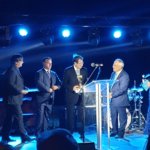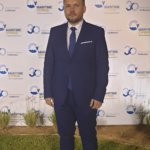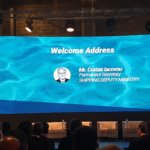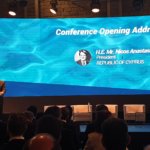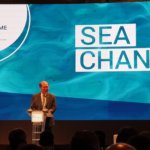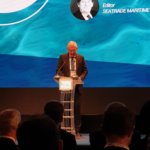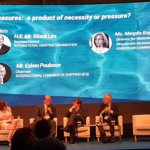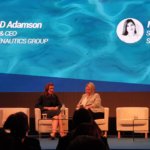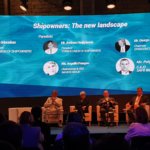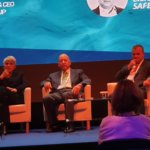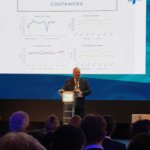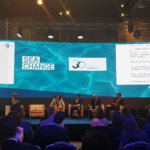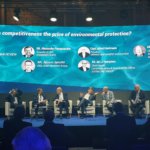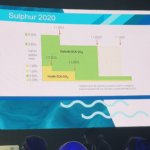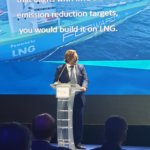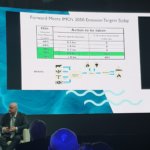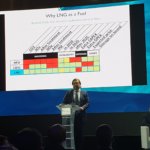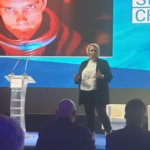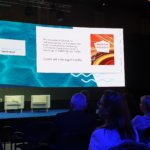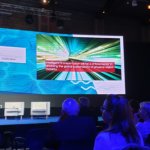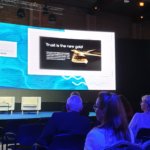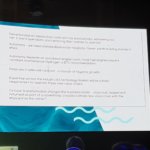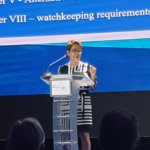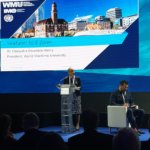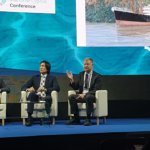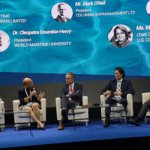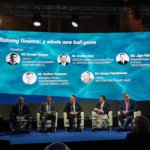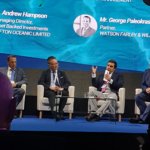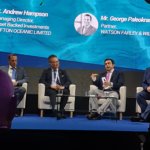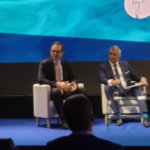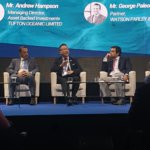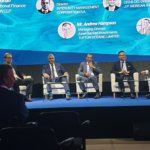Cyprus Maritime Conference „Sea Change”
17.10.2019
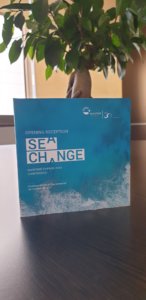
06-09.10.2019 Cyprus Maritime Conference „Sea Change”
Mr Adam Barecki had the honor to represent the company during the Cyprus Maritime Conference which took place in Limassol. This year, the conference slogan was „Sea change”, which was to draw the attention to great challenges facing the shippiong industry in the near future.
DAY 1
Conference opening address was delivered by H.E. Mr Nocis Anastasiades, President of the Republic of Cyprus. On the beginning he congratulated the Cyprus Shipping Chamber for its 30-years anniversary. Then he focused on the bright side of Cyprus shipping, talked about friendly environment for shipping companies, tonnage tax, establishing of the Deputy Ministry of Shipping. He stressed that the Cyprus government will suport the Shipping Minister, in all her afforts to build a modern and transparent Maritime cluster. Also, in was pointed, that Cyprus is in the proces of getting an approval from EU Comission regarding the new tonnage tax regime. Unveiling the secret, the President informed the audience, that the new tonnage law will include all maritime sector connected with shipping industry – ship insurance, ship brokers, IT companies etc. After the speech of the President, the first conference panel began.
The topic was”Regulatory measures: a product of necessity or pressure?”. The panel was moderated by Mr Bob Jacques from Seatrade Maritime Review. At first, Mr Kittack Lim, Secretary General of IMO, took the floor. In his opinion, the new era of shipping will change the entire sector for good. New technologies, social expetation related to environmental protection will detrmine the course of action. And IMO is following this course by adopting:
- global sulphur-cap limit (in force from 01.01.2020),
- reduction of greenhouse gases emission (by at least 50% by 2050 compared to 2008),
- energy-efficiency measures (IMO has established a series of baselines for the amount of fuel each type of ships burns for a certain cargo capacity).
Then the floor was taken by Mrs. Magda Kopczynska, Directors for Waterborne Transport DG MOVE within the European Comission. She stressed that the most important thing is to establish a proper framework and later increase of cooperation between shipping industry representatives and European Comission. EU regulate to bring about change for the better, she underlined that we need to remember that emissions impact of shipping to put pressure on both sides – the Regulatory and the Industry – to act, because decarbonisation was put shipping in the spotlight.
Next speaker – Mr Esben Poulson, Chairman of the International Chamber of Shipping, presented a bit different point of view. A shipping point of view. He starts with with the following argument – „the Regulator needs to be more realistic. It is easy to set further restrictions regardless of the consequences or who will bear the burden of change. The heavy of change, in his opinion, shouldn’t be only on shipowners side, a whole block chain needs to adopt and following the new regulations – fuel; suppliers, shipyards etc.” From the one side, IMO is putting a lot efforts to reduce the greegases emission up to year 2050, but in this year will be a lot of new ships. Will their quantity meet these requirements? Next example is the case of openloop scrubbers. Shipowners has been invest in this technology a lot of money and right now it comes out that some ports are banning vessels with such installation. There are still no clear quideliness in this matter, he said.
He stressed that shipping industry is trying to following the change. Companies are investing in the research of alternative fuels. The big concern is the availability of new fuels, the sector doesn’t now the new products o for that reason the industry need a help from the regulator, to be properly prepare to the change – IMO’s guidances etc. Otherwise all this changes can harm the shipping industry. At this moment Mr Polson was assured by Mr Lim, that the IMO is supporting its members by publishing quidances, organizing workshop to implement the changes smoothly. Mrs Kopczynska added that EU did everything that it should, to prepare the industry for the changing. She told that its all about to prepare better not to delaying. The panel agreed that without global regulations, it will be difficult to maintain a level playing field for shipping. It was suggested that environmental protection represents not only a challenge but also an opportunity to drive innovation.
The second panel starts with the following topic:”Shipowners: the new landscape”, moderated by Mr George Mouskas, V-ce President of the Cyprus Union of Shipowners (CUS). Panelists tried to answer on a question – what is hould ne done to meet the new targets in 2020, 2030 and 2050? According to Mr George Procopiou, Chairman of Dunacom Tankers Management, it’s hypocritical to talk about environmental protection without indicating a specific ways how to do it. In his opinion, for now, the best solution is reducing vessels speed to achieve the targets. It will works from the first day, he said. The second panelist Mrs. Angeliki Procopiou, Chairman & CEO of Navios Group stressed that the regulator should take into consideration the cost if it thinks about any new regulations. Right now all costs related to restricted environmental policy are bears by industry stakeholders. The sector is not getting subsidiares like other sectors. Mr Polys Hajioannou, President of CUS fully agreed with the previous speker. He added that stakeholders are covering all expenses – scrubbers, LNG engines without certainty whether the charterers will take these expenses into account when setting freight rates.
All panelist agreed that it’s very important to safe „the european flags”. As an example they given China and USA, countries that are protecting its own flag. European Union can’t lead to a situation that the stakeholders will be forced to move their business outside the Europe. Shipping business need to stay in Europe otherwise the whole continent can be cut off from supplies. Regarding the trade war topic it was found that business is growing properly when the worldwide situation is stabill.
The third panel had the following topic: „Are there brighter days ahead for shipping?”. The moderator, Mr Mark Williams, Managing Director of Shipping Stretegy Ltd. started with argument that politicians need to start to look at the shipping industry demand. They can’t generate new laws without any knowledge about the shipping. How you can tell the stakeholders that using of some fuel is not allowed, without knowing wheter suppliers will be able to provide the right quantities? Mr Mikael Skov stressed that shiping relies upon people. So the whole industry need to follow its demand. At the moment this demand is to take care about the enviroment. The younger generation want to see a clear message from shipping stakeholders – what do we do to protect our planet. Then Mrs. Sadan Kaptanoglou, Chairwoman of Kaptanoglou Group & BIMCO President, said that she belives that the perception of shipowners in unfair. All stakeholders are comitted to improving its impact on the enviroment and making things better for our children and grandchildren. The last panelist Mr Andreas Hadjiyiannis, President of CUS, calls for greater logic. He said „that logic dictates that you start with invention, then product and then regulation, not the reverse. Otherwise who takes the risk? We do. And it’s not good for shipping iundustry”.
DAY 2
The leading topic was: „Is competitiveness the price of environmental protection?”. Mr Bob Jaques moderated the panel. All panelists agreed that the biggest stakeholders investing a lot of money in new technologies. Thet are searching for new types of fuel and new types of engines to met the new requirements. An enviromental protection is not only a challange. Challanges are new technologies – LNG, natural gas, hudrogen etc. The issue is, how to make all this technologies safe for people on board the ships? Sooner or later, every shipping company should focused on new technologies, to remain competitive. Mr Alfred Hartman, President of German Shipowners Association, said that ahead shipping there are huge challenges. The first is sulphur-cap limit that will be valid from 01.01.2020 – does suppliers will have enought quantity of new fuel? What with certification? It is important that crew on board must be sured that the vessel is using proper fuel, to avoid any penalties. Rest quests focused their addresses on alternative fuels. And so, Mr. Alexandros Panagopoulos, CEO of Forward Ship, told a lot about LNG engines and fuel. As a strong arguments for its use he gave the avalibility and prices. He highlighted that there is a lof of narural gas all over the world. Minning is getting cheaper thanks to new technologies. At the moment, it can be a problem with supply of LNG in the world ports. But as he told, a lot of new installation is under construction so in the near future there will be no problem with supplies. Mr. Bjorn Tore Larsen, CEO of OSM Maritime Group, added that seafarers will required a proper training regarding new types of fuels. For that reason the OSM Group is preparing to launch the supervison center, to suport the crew, avalivable 24/7. Mr Ian HAmpton, Chief People, Communications & Sustainbility Officer of Stena Line Group, said that Stena is working on methanol fuel and ship batteries. Both technologies are in a testing mode. He admit that if right now we are talking about batteries we need to talk about rare metals.
The panel was ended with speech delivered bt Ms. K D Adams, CEO of Futurenautics Group. She focused on decarbonisation of shipping. In her opinion it is only and only way to save the planet. She appealed to rationalize the supply chain – „if something can be produced in the country, why export is by using ships?”. This approach was met with lively reaction from listeners. There were voices that the problem for shipping is the lack of money to be properly prepared for enviromental regulations. The industry needs goverments suport, otherwise stakeholdersd are not able to face the new challenges alone. Ms Adams said there will be a seismic change and suggested that the fundamental assumptions on which business, society, and the economy have been based for centuries will need to be re-evaluated. Her belief is that the future for shipping is digital, decarbonised, and circular, which will drive growth and value creation.
The main topic of the second panel was: „Managing change: Disruption od destruction?” Craig Eason, Editorial Director of Fathom World, was the moderator for this discussion, and the panel included Maja Markovčić Kostelac, Executive Director of the European Maritime Safety Agency, Noah Silberschmidt, Founder & CEO of Silverstream Technologies, Cees-Willem Koorneef, Director of PORTXL Antwerp & PORTXL Rotterdam, and Despina Panayiotou Theodosiou, President of WISTA International and CEO of Tototheo Maritime. The panel discussed how the shipping industry can use developments in technology to be better, smarter, and greener. The importance of the human element was again underlined, with acknowledgement that diversity and inclusion will be central to adapting to the challenges that lie ahead. The panel agreed that education of the younger generation is the starting point to ensuring the opportunities and rewards of a career in shipping are understood.
DAY 3
The topic of first panel was: „Seafarer to e-farer.” The panel was moderated by Mr Craig Eason, Editrorial Director of Fathom World. Ms. Mayte Medina, Chief Office of Merchant MAriner Credential of US Coast Guard. She wtarted with few word about STCW convention, that the convention described only the minimum requirements for seafarers that served on board the seasgoing vessels. She said : „To have a good seafarer, stakeholders needs to go further with crew trainings. Right now vessels are equipped with different new technology equipment, thats is why it is important to training seafarers all the time. To acknowledge them with equipment on board. They required specific training on devices that are in use on board.”
Ms. Cleopatra Doumbia, President of World Maritime University” added that we need to identify the training gaps for today’s seafarers to have properly trainned tomorrow’s e-farers. In her opinion in the future, there will be reduced number of seafarer and vessels. She said: „The future e-farer should have the following skills: Technical skills to operate the vessel properly, human relations skills, critical thinking skills, sense making and enviromental suistanbility skills”.
China’s point of view was represented by Mr Hing Chao, Executive Chairman of Wah Kwong Maritime. He said that for China the most important issue i show to create a proper model of training that will follow with all new regulations requirements. He added that more Chines doesn’t want to work at sea. They are facing with laco of proper candidates. That’s why thet are investing a lod of money in new Maritime schools in suburb China area, to encourage people to change the industry. Mr Mark O’Neil, President of Columbia Shipmanagement Ltd., stressed that seafarers need to be more adoptative to new technologies, policies, approaches. We have to look at the specific trainings needs of each seafarer to properly trained them. The good soultion is to prepare some kind of training regime for crew’s on board.
After coffee break, the second panel was start. The topic: „Raising finance: a whole new ball game”. The panel was moderated by Mr Jasel Chauhan, Head of International Finance of Hill Dickinson LLP. The following panellists took a part in the conversation:
- Mr Andrian Dacy, CEO & CIO, Global Transporting Group of J.P. Morgan Asset Management,
- Mr George Mangos, Director of Interunity Management Corporation S.A.,
- Mr Jigo Hayashi, General Manager, International Shipping & Finance of Tokyo Century Corporation,
- Mr Andrew Thomson, Managing Director od Tufton Oceanic Limited,
- Mr George Paleokrassas, Partner at Watson Farley & Williams.
Most of the panelists present similar approaches, that small players can not count on funding from big banks. To get a funding, companies needs to carefully and clearly keep their accounting books and to have solid base. Mr. Hing Chao assured that in Japan you will received a loan if your plan is good. He stressed that at present, Europe is more „consertative” to give a loan especially for shipping companies. Mr Andrian Dacy react by telling, the banks are dam before creating an investment buuble. He bravely stated that in some ways, banks are regulating the number of ships in the world, keeping the enviromental safe. In his opinion environmental, social and governance issues are now major investments drivers. Shipowners need stronger environmental and social strategies and better corporate governance to attract financing.
Mr George Mangos stated that shipowners seeking the financing outside the banking sector, often agreeing to high interest rate. Mr George Paleokrassas said, that: „I see a loty of interest from a diverse range of participants, with more alternative lenders as bank disappear. But investors can be put off; they see a return but not recognise that if they hit a problem, the cost / losses incurred could be huge”. All panellist agreed that banks will invest money only in „safe cases”. This panel closed the conference.
As you can see during the conference many interesting theses were made. Various points of view were presented with many different arguments. It can be said, that two different approaches clashed on the conference. Two different visions of development and achivement of the set enviromental goals – conservative and progressive, not to say revolutionary. There is one sure thing – big challenges are ahead shipping. The future will show if the good way was choosed correct.

